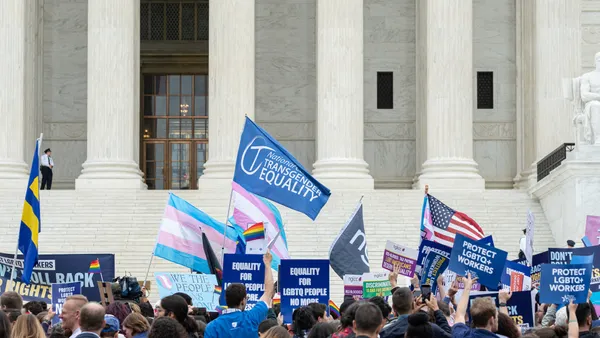Dive Brief:
- A former KPMG business development and consulting manager who worked remotely from Georgia can sue for discrimination under New York state and local laws, a federal district court held April 14 (Roddey v. KPMG LLP).
- At the height of the COVID-19 pandemic, KPMG hired the manager, who is African-American, to work in New York City, according to court records. Due to its COVID remote workplace, the tax advisory and accounting firm required her to work from her residence in Georgia for six months and then relocate to the New York City area, court records reflected.
- The manager claimed that during this time, KPMG allegedly refused to give her business opportunities because it didn’t “want to put an African American face” on available projects. She allegedly complained several times, including to KPMG’s ethics office, but was fired a short time later.
Dive Insight:
Following her termination, the manager sued KPMG for alleged race discrimination and retaliation under New York’s and New York City’s Human Rights Laws. The district court refused to dismiss the claims.
Last year, New York’s highest court clarified that the laws each “protect nonresidents who are not yet employed in the city or state but who proactively sought an actual city- or state-based job opportunity,” the district court explained.
Here, the manager alleged she would have been required to work in-person from KPMG’s New York City office once its COVID remote policy was lifted, the court noted.
The manager further alleged she was denied the opportunity to do so because of KPMG’s alleged discrimination and retaliation, the court added. For this reason, she demonstrated that KPMG’s alleged actions had an impact in New York, and she could go forward with her claims under the state and city human rights laws, the court held.
The takeaway? Even with the push to return to the office, many workers are still partly or fully remote, and employers must stay on top of state and local laws that protect remote workers, particular those working across state lines.
In addition to prohibiting employment discrimination, state and local laws typically include requirements related to leave, wages, expense reimbursement, taxes and employment-related postings and notices, attorneys previously explained to HR Dive.
Employers should also keep in mind that federal laws protect remote workers as well. The Americans with Disabilities Act took center stage during the COVID pandemic, but its principles regarding teleworking and reasonable accommodations are still intact, experts have said.
In her lawsuit, the former KPMG manager included a federal race discrimination and retaliation claim under Title VII of the Civil Rights Act of 1964. However, the court did not address it in this ruling.
According to court documents, the manager alleged that in October 2021, about a week after she started working for KPMG, her supervisor informed her she was being proposed for a project out of St. Louis, Missouri. Despite expressing safety concerns about the assignment due to the unrest in the area following George Floyd’s murder, KPMG still sent her an email introducing her to the St. Louis team, she alleged.
The manager also alleged that similarly situated managers who were not African American received business development opportunities and support she was denied.
KPMG allegedly investigated her complaints but told her it couldn’t substantiate her allegations and fired her, purportedly for rejecting projects, court records reflected.
During her employment, the manager was given a New York phone number for work calls. She reported to the New York office twice, her paycheck deducted New York state taxes, and she received unemployment benefits from the state after she was terminated, court documents said.













